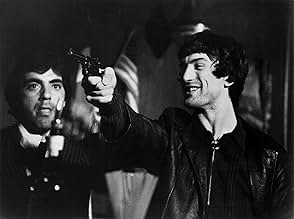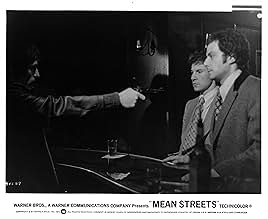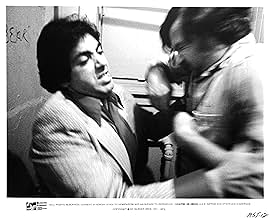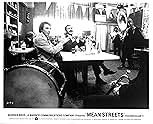Un matón de poca monta aspira a subir de rango en la mafia local.Un matón de poca monta aspira a subir de rango en la mafia local.Un matón de poca monta aspira a subir de rango en la mafia local.
- Dirección
- Guión
- Reparto principal
- Premios
- 5 premios y 5 nominaciones en total
Victor Argo
- Mario
- (as Vic Argo, Victor Argo)
Murray Moston
- Oscar
- (as Murray Mosten)
Reseñas destacadas
Mean Streets has all the characteristics we have come to associate with Scorsese - the fluid camerawork, the expressionistic lighting, the sudden explosions of violence, the eclectic soundtrack. In later films, he took cinema to new heights with the flowering of his technical skills and the broadening of his material, but Mean Streets remains unsurpassed for the emotional intensity which only a young director, passionate about film and intent on making a personal statement, could achieve.
The theme of the film is contained in the famous first line 'You don't make up for your sins in church; you do it in the streets' (a Scorsese voice-over). An extended preface which delineates the nature of the film and its characters before the narrative begins includes brief cameo scenes introducing the four protagonists (a much copied device: see, for example, Trainspotting).
Scorsese's alter-ego is played as in the earlier 'Who's That Knocking At My Door?' by Harvey Keitel, giving the performance of his young life. He is Charlie, a junior member of a Mafia family who collects debts and runs numbers, but who also has aspirations to sainthood. The other key figure is his anarchic friend, Johnny Boy, played with ferocious energy by de Niro.
Charlie is introduced coming out of confession, dissatisfied with his penance. Reciting words doesn't mean anything to him and he can't believe that forgiveness could come so easily. Deliberately burning his hand in a candle flame is a more effective reminder of the pain of hell. The camera follows Charlie from the altar into Tony's bar, a red-lit inferno, and when Johnny Boy comes in, to the tune of Jumping Jack Flash, Charlie recognises that this is the form his penance will take. Johnny Boy is the cross he must bear. 'You send me this, Lord' he says resignedly.
Johnny Boy's irresponsibility and impulsiveness make him everything Charlie, with his controlled, anxious, guilt-ridden persona, is not. The argument which follows in the back room about Johnny Boy's debts deserves its reputation as one of the great scenes in seventies cinema.
Charlie's life moves in well worn, claustrophobic circles. Hardly anyone outside his immediate circle appears in the film and other ethnic groups are viewed with suspicion. The characters seldom appear outdoors or in daylight. Charlie inhabits a world of bars, pool halls and cinemas. In the one scene he appears in sunlight, he looks ill at ease. The suit and heavy overcoat he wears (reflecting his Mafiosi ambitions) look distinctly out of place on a beach. It's significant that in this scene Teresa, his girlfriend, scorns his small-time gangsterism and challenges him to join her in moving away to a new life. But Charlie is trapped by his desire to please his uncle.
Scorsese has said that his choice in adolescence lay between becoming a priest and becoming a gangster and that he failed on both counts. Mean Streets allows him to explore that choice to devastating effect.
The theme of the film is contained in the famous first line 'You don't make up for your sins in church; you do it in the streets' (a Scorsese voice-over). An extended preface which delineates the nature of the film and its characters before the narrative begins includes brief cameo scenes introducing the four protagonists (a much copied device: see, for example, Trainspotting).
Scorsese's alter-ego is played as in the earlier 'Who's That Knocking At My Door?' by Harvey Keitel, giving the performance of his young life. He is Charlie, a junior member of a Mafia family who collects debts and runs numbers, but who also has aspirations to sainthood. The other key figure is his anarchic friend, Johnny Boy, played with ferocious energy by de Niro.
Charlie is introduced coming out of confession, dissatisfied with his penance. Reciting words doesn't mean anything to him and he can't believe that forgiveness could come so easily. Deliberately burning his hand in a candle flame is a more effective reminder of the pain of hell. The camera follows Charlie from the altar into Tony's bar, a red-lit inferno, and when Johnny Boy comes in, to the tune of Jumping Jack Flash, Charlie recognises that this is the form his penance will take. Johnny Boy is the cross he must bear. 'You send me this, Lord' he says resignedly.
Johnny Boy's irresponsibility and impulsiveness make him everything Charlie, with his controlled, anxious, guilt-ridden persona, is not. The argument which follows in the back room about Johnny Boy's debts deserves its reputation as one of the great scenes in seventies cinema.
Charlie's life moves in well worn, claustrophobic circles. Hardly anyone outside his immediate circle appears in the film and other ethnic groups are viewed with suspicion. The characters seldom appear outdoors or in daylight. Charlie inhabits a world of bars, pool halls and cinemas. In the one scene he appears in sunlight, he looks ill at ease. The suit and heavy overcoat he wears (reflecting his Mafiosi ambitions) look distinctly out of place on a beach. It's significant that in this scene Teresa, his girlfriend, scorns his small-time gangsterism and challenges him to join her in moving away to a new life. But Charlie is trapped by his desire to please his uncle.
Scorsese has said that his choice in adolescence lay between becoming a priest and becoming a gangster and that he failed on both counts. Mean Streets allows him to explore that choice to devastating effect.
Like the Irishman long after it, Mean Streets is a gangster film that hones in on the mundanity of it all. The violence is pretty nasty when it happens but for the most part, focusing on the everyday life of these low level gangsters and their struggles in recognisably Scorsese fashion is this film's greatest strength.
Harvey Keitel leads the film with an inner turmoil that's great to witness. Overall, it's a very restrained performance which works so well since he's repressing all of his troubles. Seeing Robert De Niro in a role like this really shows how far he's come as this volatile and juvenile performance is almost unrecognizably him.
As director, co-writer and co-editor, Martin Scorsese has a fully formed vision. His usual themes are present, the editing mostly has the rhythm of his later work and New York is definitely a character in itself. Another signature trait of his work are the needle drops and there's a terrific selection of them on display in this.
Harvey Keitel leads the film with an inner turmoil that's great to witness. Overall, it's a very restrained performance which works so well since he's repressing all of his troubles. Seeing Robert De Niro in a role like this really shows how far he's come as this volatile and juvenile performance is almost unrecognizably him.
As director, co-writer and co-editor, Martin Scorsese has a fully formed vision. His usual themes are present, the editing mostly has the rhythm of his later work and New York is definitely a character in itself. Another signature trait of his work are the needle drops and there's a terrific selection of them on display in this.
Charlie may be small time but the authority and standing of his Uncle Giovanni in the community of Little Italy offers him the chance to become more than just a local hustler. One of the things he should be careful of is the company he keeps and who he stands with. Unfortunately Charlie is very protective of his cousin Johnny Boy, who seems determined to borrow as much money as possible, gamble it away and not pay it back and also in a relationship with Johnny's relation Teresa. While the fun and energy of the street life continues, dark consequences of all these things threaten Charlie and those around him.
It has been years since I saw this film and I noticed that I had last watched it before I started reviewing. As a result I watched it again yesterday to refresh my memory. Seeing it with older eyes is an impressive experience because I appreciate what Scorsese has gone on to do and found it fascinating to look back on this, one of his earliest films. The plot is a mash of characters and events that come together to create a sense of place that is convincingly done; the overall narrative focuses on Charlie, in particular where his relationships are taking him but this aspect ebbs and flows with the events. It is funny, violent, personal and engaging, only a few aspects come over as weak. The script flows like real dialogue, producing the different moods of each scene and also being memorable and rough.
The style and direction of the film are impressive and it is interesting to see the influence Scorsese had with this and his other films. The techniques employed here will ring bells with anyone who watches modern cinema and television with more than a passing interest, Sopranos in particular owes him a debt. Here we have the slow-motions, chest-mounted camera (I'm sure there is a proper name for it), impressive use of music and so on that we have come to be used to with Scorsese and one cannot help be impressed by how well developed these ideas were at an early stage in his career. Of course along with stylistic constants, several of the cast would become regulars. Keitel is the heart of the film for me and, although his opportunities in the script are surprisingly limited, I felt he did well with the themes handed to him. De Niro of course catches the eye more because of what was to come but also because he has the more energetic character. Robinson didn't make much of an impression on me but the support cast features early turns from faces such as Proval, Romanus, Argo and others.
Mean Streets might be a bit rough and ready when placed next to the polished films that Scorsese would go on to do but it does not take away from its strengths to look back at it. So much of Scorsese's style and calling cards are in place even at this early stage and his film convincingly creates the streets and characters of the place. The main players involved have done better films since this one but it is still strong, stylish and interesting and definitely worth a look for anyone who has since any other Scorsese films.
It has been years since I saw this film and I noticed that I had last watched it before I started reviewing. As a result I watched it again yesterday to refresh my memory. Seeing it with older eyes is an impressive experience because I appreciate what Scorsese has gone on to do and found it fascinating to look back on this, one of his earliest films. The plot is a mash of characters and events that come together to create a sense of place that is convincingly done; the overall narrative focuses on Charlie, in particular where his relationships are taking him but this aspect ebbs and flows with the events. It is funny, violent, personal and engaging, only a few aspects come over as weak. The script flows like real dialogue, producing the different moods of each scene and also being memorable and rough.
The style and direction of the film are impressive and it is interesting to see the influence Scorsese had with this and his other films. The techniques employed here will ring bells with anyone who watches modern cinema and television with more than a passing interest, Sopranos in particular owes him a debt. Here we have the slow-motions, chest-mounted camera (I'm sure there is a proper name for it), impressive use of music and so on that we have come to be used to with Scorsese and one cannot help be impressed by how well developed these ideas were at an early stage in his career. Of course along with stylistic constants, several of the cast would become regulars. Keitel is the heart of the film for me and, although his opportunities in the script are surprisingly limited, I felt he did well with the themes handed to him. De Niro of course catches the eye more because of what was to come but also because he has the more energetic character. Robinson didn't make much of an impression on me but the support cast features early turns from faces such as Proval, Romanus, Argo and others.
Mean Streets might be a bit rough and ready when placed next to the polished films that Scorsese would go on to do but it does not take away from its strengths to look back at it. So much of Scorsese's style and calling cards are in place even at this early stage and his film convincingly creates the streets and characters of the place. The main players involved have done better films since this one but it is still strong, stylish and interesting and definitely worth a look for anyone who has since any other Scorsese films.
Scorsese's first film, the interesting catastrophe "Boxcar Bertha," marked his birth as a director, but it was with his second feature, "Mean Streets" that we witnessed the birth of an artist. Most of "Mean Streets" is slightly unfocused with a simplistic plot based around a lot of machismo grandstanding and long bouts of boring dialog (occasionally made interesting by DeNiro's off-kilter star-making turn as Johnny-Boy), with spats of visceral violence (far less gory here than in later Scorcese pics), and a visual bravado that seems slightly less disciplined but no less entertaining than your standard Scorsese crime flick.
Despite its drawbacks (mainly due to youth and inexperience), the template was set. The opening credits (done to the tune of "Be My Baby") suck you right into the film, and the rest of the movie is peppered with Scorsese's loving treatment of popular music that would later become one of his most endearing hallmarks. The basic premise featuring Harvey Keitel as Charlie (the young hood with a heart of gold and conflicted internally by the religion of the Church and the religion of the Streets), Robert DeNiro as Johnny-Boy (the equally loved and hated loose-canon brother figure), and Amy Robinson as Theresa (the woman our hero wants to put on a pedestal as a saint but often treats like a whore), is a trifecta of archetypes we see repeated again and again in Scorsese's films (most obviously in "Casino" with the DeNiro-Pesci-Stone characters, and most subversively in "The Last Temptation of Christ" with Jesus-Judas-Mary Magdalene). The religious iconography, the brotherhood of crooks, the attraction to the gangster lifestyle, the keen eye for depicting violence in artistic and startling ways...these are displayed here in "Mean Streets" in their rawest form.
Though flawed in many ways, "Mean Streets" set the stage and laid the the template for the type of film Scorsese would perfect seventeen years later with "Goodfellas." This heralded the arrival of a new talent and a new genre, and the world of film has thankfully never been the same.
Despite its drawbacks (mainly due to youth and inexperience), the template was set. The opening credits (done to the tune of "Be My Baby") suck you right into the film, and the rest of the movie is peppered with Scorsese's loving treatment of popular music that would later become one of his most endearing hallmarks. The basic premise featuring Harvey Keitel as Charlie (the young hood with a heart of gold and conflicted internally by the religion of the Church and the religion of the Streets), Robert DeNiro as Johnny-Boy (the equally loved and hated loose-canon brother figure), and Amy Robinson as Theresa (the woman our hero wants to put on a pedestal as a saint but often treats like a whore), is a trifecta of archetypes we see repeated again and again in Scorsese's films (most obviously in "Casino" with the DeNiro-Pesci-Stone characters, and most subversively in "The Last Temptation of Christ" with Jesus-Judas-Mary Magdalene). The religious iconography, the brotherhood of crooks, the attraction to the gangster lifestyle, the keen eye for depicting violence in artistic and startling ways...these are displayed here in "Mean Streets" in their rawest form.
Though flawed in many ways, "Mean Streets" set the stage and laid the the template for the type of film Scorsese would perfect seventeen years later with "Goodfellas." This heralded the arrival of a new talent and a new genre, and the world of film has thankfully never been the same.
Martin Scorsese has made some brilliant movies in his life, but unfortunately this isn't one of them. I can't really call it bad, because the direction and the cinematography just drip with pure talent, but I have some major problems with the plot. Mainly, where the hell is it? The story doesn't just move at a slow pace, it appears to go in incredibly tiring loops. It starts of with Johnny Boy (a solid Robert DeNiro) owing a whole bunch of crooks money, which is a pretty riveting starting point. What does he do about it? What do the crooks do about it? Nothing, and that goes on for two hours. The whole movie appears to be Harvey Keitel endlessly saying he has to pay his debts, to which he refuses, to which he asks it again half an hour later, to which he like, makes up an excuse and goes to the movies, and all of it feels so redundant. The movie finally gets to the point in the end, but that doesn't really save it. It shows the sadness of the bad neighbourhoods in New York wonderfully, but that's really all I can say about it.
What Scorsese Film Ranks Highest on IMDb?
What Scorsese Film Ranks Highest on IMDb?
Cinema legend Martin Scorsese has directed some of the most acclaimed films of all time. See how IMDb users rank all of his feature films as director.
¿Sabías que...?
- CuriosidadesFrancis Ford Coppola contributed money to the budget of the film. However, it is rumored that he lent Martin Scorsese $3000 as the Mafia shook him down for using the San Genaro Festival as a backdrop without "permission". It's generally presumed the Mafia uses the all-cash festival to launder money from their ill-gotten gains.
- PifiasYou can see Robert De Niro's mic pack on his back when he gets up to walk to the window at Charlie's house after staying the night.
- Citas
[first lines]
Voice in Charlie's Mind: You don't make up for your sins in church. You do it in the streets. You do it at home. The rest is bullshit, and you know it.
- Versiones alternativasNBC edited 10 minutes from this film for its 1977 network television premiere.
- ConexionesEdited into American Cinema: Film Noir (1995)
- Banda sonoraJumpin' Jack Flash
Written by Mick Jagger (as M. Jagger), Keith Richards (as K. Richards) (uncredited)
By The Rolling Stones
Courtesy of ABKCO Records
Selecciones populares
Inicia sesión para calificar y añadir a tu lista para recibir recomendaciones personalizadas
- How long is Mean Streets?Con tecnología de Alexa
Detalles
- Fecha de lanzamiento
- País de origen
- Sitio oficial
- Idiomas
- Títulos en diferentes países
- Mals carrers
- Localizaciones del rodaje
- Empresas productoras
- Ver más compañías en los créditos en IMDbPro
Taquilla
- Presupuesto
- 500.000 US$ (estimación)
- Recaudación en Estados Unidos y Canadá
- 32.645 US$
- Fin de semana de estreno en EE. UU. y Canadá
- 32.645 US$
- 15 mar 1998
- Recaudación en todo el mundo
- 61.676 US$
- Duración1 hora 52 minutos
- Color
- Relación de aspecto
- 1.85 : 1
Contribuir a esta página
Sugerir un cambio o añadir el contenido que falta






































